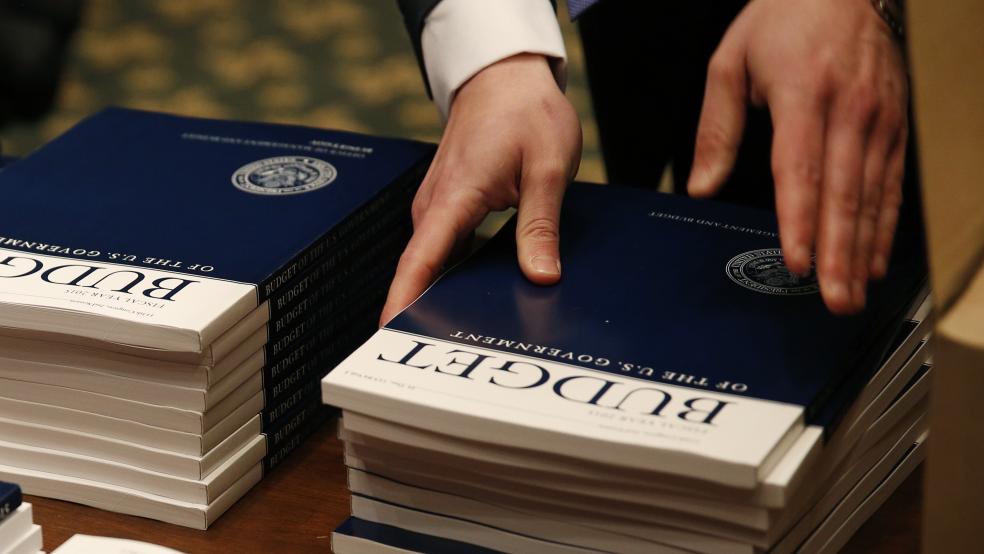President Obama on Tuesday unveiled a fiscal 2015 budget that resembles an aspirational political agenda in a tough mid-term election year, rather than a realistic blueprint for government spending and initiatives for the coming years.
With lower spending levels for the next two years already baked into the budget and appropriations deals that Congress and the president previously hammered out, Obama wants to tweak priorities and restore $56 billion in new spending on defense and to help the poor and struggling middle class in an overall budget of nearly $4 trillion.
Related: Obama Budget: $600 Billion Stimulus and Tax Hikes
The budget, dubbed “A Roadmap for Growth, Opportunity, and Fiscal Responsibility,” would also invest heavily in highways and infrastructure, though doing so would require Congress to alter the tax code. Obama laid out his previously announced four-year, $302 billion surface transportation reauthorization proposal to be paid for with transition revenue from business tax reform.
While his budget includes relatively few spending cuts, it relies mostly on more than $1 trillion in new taxes to slow borrowing over the next decade – with much of the burden falling on major businesses and the wealthy.
Even as his Republican foes dismissed the blueprint as dead on arrival, Obama declared to Congress, “What I offer is a set of concrete, practical proposals to speed up growth, strengthen the middle class, and build new ladders of opportunity into the middle class.”
Winners. Among the biggest winners in Obama’s budget: 100,000 young children who would benefit from expanded pre-kindergarten and Head Start programs; parents who would qualify for an increased child care credit; millions of long-term unemployed Americans who would receive special job training; about 5.8 million low-earning childless workers who would be offered the Earned Income Tax Credit for the first time; and states that would benefit from expanded infrastructure funding.
Related: Obama Looks to Tax Reform to Save America’s Highways
The Pentagon, struggling to live within the curbs Congress has imposed on agency spending, would get roughly half the additional spending sought by Obama. Those extra funds for readiness would come at a time when Defense Secretary Chuck Hagel has warned the DOD will have to reduce the Army’s size to levels last seen before World War II, cut back on the Navy’s purchase of ships and vessels, and close more military bases.
Losers. Among the losers in Obama’s budget: wealthy taxpayers and some businesspeople who would have to absorb the cost of nearly $60 billion of new spending. The budget would eliminate two loopholes in the tax code that reduce taxes for some self-employed professionals and investment fund managers. House Ways and Means Committee Chairman Dave Camp (R-MI) suggested a similar change as part of the major tax overhaul plan he released last week. Other spending cuts and tax measures would offset the cost of the initiatives.
Other losers include tens of thousands of people living illegally in the country who have benefitted from Medicare. The new budget and a new regulation would remove illegal immigrants from Medicare rolls and explicitly require citizenship or lawful presence in the U.S. as a condition of receiving Medicare, The New York Times first reported.
Obama’s new budget and a competing budget proposal being drafted by House Budget Committee Chairman Paul Ryan (R-WI) will help set the stage for the political debate this fall as the Republicans try to regain control of the Senate and increase their majority in the House at a time when the president’s approval rating is near historic lows.
Related: Economists Say Paul Ryan Misrepresented Their Research
Obama has vowed to focus on addressing income inequality and the vast economic gap between the nation’s rich and poor. Ryan, the GOP’s 2012 vice presidential nominee and a possible contender for the 2016 presidential nomination, is working on a GOP budget plan to overhaul the nation’s welfare system. He would achieve that in part by cutting spending on social safety-net programs that Ryan and other Republicans say have locked millions of people in poverty.
Ryan dismissed the president’s budget proposal as “yet another disappointment” that reinforces the status quo.
“It would demand that families pay more so Washington can spend more,” Ryan said in a statement. “It would hollow out our defense capabilities. And it would do nothing to preserve or strengthen our entitlements. The president has just three years left in his administration, and yet he seems determined to do nothing about our fiscal challenges.”
Senate Budget Committee Chair Patty Murray (D-WA) called Obama’s budget plan a strong blueprint for building on last year’s bipartisan budget deal “to create jobs, expand opportunities, and tackle our deficits and debt fairly and responsibly.”
Related: Congressional Odd Couple Finally Strikes a Budget Deal
Congress achieved the dubious distinction of last year of passing less significant legislation than any Congress in decades, and it appears on course to match that record this year. As a result, Obama’s latest proposals have dim prospects at best for passage in the Republican-controlled House.
Top Reads from The Fiscal Times:





